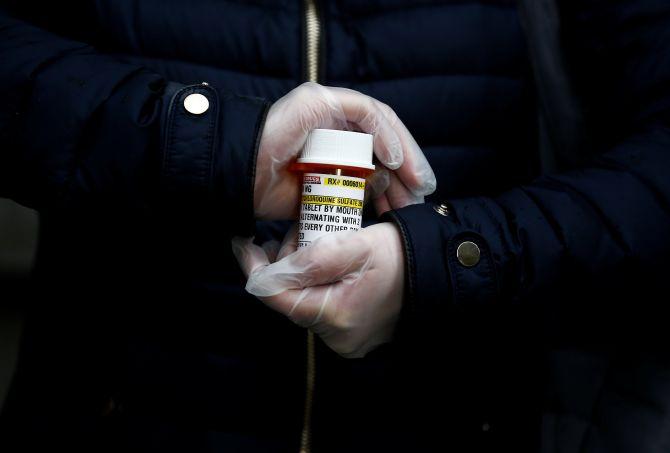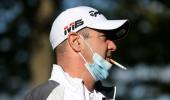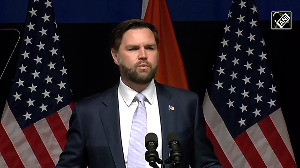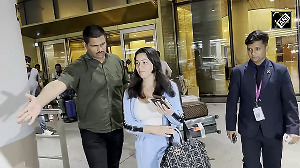'WHO has been under a lot of attack, so when they saw the Lancet study, they stopped the clinical trials of HCQ.'
'They should not have stopped the clinical trials.'

Hydroxychloroquine was one of the most talked about medicines in the fight against COVID-19 when US President Donald J Trump threatened India to export the medicine to his country. Then, Trump said he was taking it as a preventive against the coronavirus.
Among the clinical trials of four drug combinations that were being conducted all around the world with approvals from WHO, was HCQ.
After an article appeared in the respected medical journal Lancet questioning the use of HCQ against the coronavirus, WHO temporarily suspended all its clinical trials. France, Italy, Belgium followed suit and stopped its HCQ trials.
The Indian Council for Medical Research has continued with its HCQ trials and has found that consumption of four or more doses of HCQ along with the use of PPEs reduce the risk of coronavirus infection healthcare workers face.
Even before the result of the ICMR study emerfged, a letter signed by Dr Shekhar Mande, director general, Council for Scientific and Industrial Research; Anurag Agarwal, director, Institute of Genomics and Integrative Biology; and Dr Rajeeva Karandikar, director, Chennai Mathematical Institute, was sent to WHO and Lancet questioning its study.
"It was a knee-jerk reaction and WHO's decision is going to create confusion among people," Dr Karandikar, below, a well-known statistician, explains to Shobha Warrier/.
Why did you three scientists write a letter questioning the Lancet study that said HCQ was more harmful and unhelpful for COVID-19 patients, which prompted WHO to stop all clinical trials of HCQ?
One reason was the Lancet study made WHO stop all the clinical trials involving hydroxychloroquine.
Though the clinical trials were stopped in many countries, ICMR continued with the trials. In India, we still use the medicine as a preventive among healthcare workers.
We felt the scientific community should look at this issue independently.
Dr Shekhar Mande, who is in the thick of all this, has been a friend of mine for many years. He asked me to look at the Lancet study from the point of a statistician.
His question to me was: Should the Lancet study be taken at face value, and should the trials be stopped?
That was why I looked at the paper and the statistical basis behind the study very carefully.
The main concern for me was, which we have mentioned in the letter, that the proven methodology in such cases is randomised controlled trials.
We also understand that these are unusual times where observational studies are done.
So, it has to be examined very carefully and the conclusion has to mention that this was an observational study and not a clinical trial.
In fact, the Lancet article concludes thus: 'In summary, this multinational, observational, real world study of patients with COVID-19 requiring hospitalisation found that the use of a regimen containing hydroxychloroquine or chloroquine (with or without a macrolide) was associated with no evidence of benefit, but instead was associated with an increase in the risk of ventricular arrhythmias and a greater hazard for in-hospital death with COVID-19. These findings suggest that these drug regimens should not be used outside of clinical trials and urgent confirmation from randomised clinical trials is needed.'
It has clearly mentioned the limitations of the observational study. Then how can this be the basis for stopping clinical trials?
You said the statistics underlying it is faulty, so it would not stand the test of time. Why?
We always speak of compounding factors that would influence a study.
For example, there are people with cholesterol, hypertension, old age, etc and it is believed that they are more susceptible to risk.
In a randomised control trial, what is done is, for example, if you take age as the criterion, the samples are divided according to age, and then equal number of subjects are taken for both the medicine group and the controlled group.
This is how we balance the impact of every factor.
In this study, the authors have taken care of some of these factors using well known statistical techniques.
But what is missing in the data which is very critical, that is, who got hydroxychloroquine-based treatment and who did not. At least, this is not mentioned in the analysis of the Lancet article.
It could be that the serious patients might have been given the medicine and the others might not have.
But the article simply says people who were given hydroxychloroquine were much worse off.
So, were they trying to say that HCQ was working against the patients and making matters worse?
What they are trying to project is HCQ does not just help, but harm the patients.
Against this background it is important to know how patients were chosen and who got the treatment.
You mean because this factor is not mentioned, the statistics behind the study is faulty?
Yes, it appears to be a very important factor, but not accounted for.
And when such a critical aspect is missing in the study, from the statistics point of view, this study is faulty.
This is the main objection that we have.
As I mentioned earlier, if patients with severe symptoms were given HCQ and the others were not, then we cannot come to any conclusion about the efficacy of HCQ in treating COVID-19.&
The article is completely silent on this most crucial factor.
In any case, at most we can go with the final sentence of the article, 'These findings suggest that these drug regimens should not be used outside of clinical trials and urgent confirmation from randomised clinical trials is needed.'
But what happened was WHO stopped clinical trials of HCQ based on this paper.
In India and in many other countries, HCQ has been used as a preventive medicine against COVID-19 among healthcare workers, police on duty, etc. Of course, taking into account other conditions.
Do you think WHO was in a hurry to stop the clinical trials?
Yes. It was a knee-jerk reaction and WHO's decision is going to create confusion among people.
 The Lancet study was only about the confirmed cases, that is, patients who were infected
The Lancet study was only about the confirmed cases, that is, patients who were infected
Those who are infected, those who need treatment, and those who need the medicine as a preventive are two different things.
The study says nothing about the usage of HCQ as a preventive.
The study only talks about those patients who are admitted in the hospitals infected with COVID-19, and were given HCQ within 48 hours of detection.
It talks only about usage of HCQ as a treatment for those who are infected.
So, you are of the opinion that WHO should not have stopped all clinical trials based on such a report?
Yes, clinical trials of the usage of hydroxychloroquine should not have been stopped.
India is continuing with the clinical trials, but I am told many countries have stopped the clinical trials they were undertaking after the WHO announcement.
WHO was overseeing the trials of four drug combinations.
After going through the Lancet study, WHO suspended the hydroxychloroquine clinical trial, but it has given permission for the other drug trials.
This is very unfortunate, we felt. In any case, India is continuing with the trial.
Did you send your letter to Lancet and WHO?
We sent a copy of the letter to the Lancet editor and a discussion is going on with them.
We have also sent our letter to WHO.
But we want the scientific community to take note of this.
It is not that only we three have raised this issue.
A day after we sent the letter, around 180 scientists from the Western world also have questioned the study and it has appeared in The New York Times.
Who would you blame for this situation, Lancet or WHO?
Lancet can be absolved of its responsibility because in medical science, observational studies are taken into account.
In this study, the concluding lines of the authors are that randomised trials are necessary. So, I will not question Lancet much.
Though I am not blaming WHO, it is a knee jerk reaction.
We are aware that everybody is on edge right now. And WHO has been under a lot of attack so, when they saw this study, they went ahead and stopped the clinical trials of HCQ.
Anyway, WHO should not have stopped the clinical trials of hydroxychloroquine.
Yes, we know HCQ is an anti-malarial drug, and here we are fighting a virus.
On a lighter note, many drugs that were developed to help something are later used for some other purpose, after extensive trials. The most famous one is Viagra!
So, it is absolutely necessary that we continue with the clinical trials of hydroxychloroquine.












 © 2025
© 2025